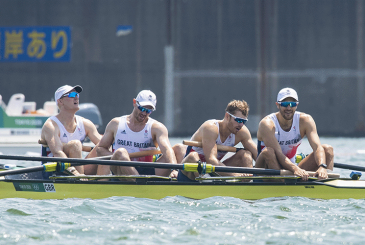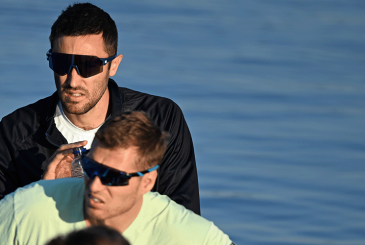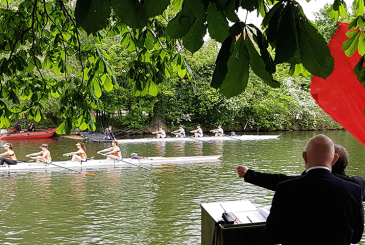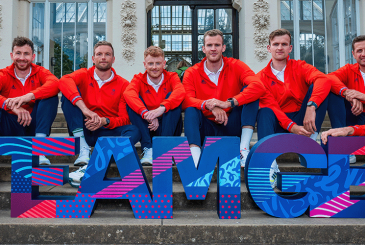Life has highs and lows – Sophie Bashford, Senior Performance Psychologist at British Rowing, gives advice for surviving stress, emotional or mental struggles
In this article, Sophie guides us through a psychological exploration of concepts such as challenge, stressors, pressure, and coping. It’s all about developing healthy and helpful coping strategies given such experiences are an inevitable part of our human experience. She has written this from an applied perspective in the hope that you’ll be able to apply any learnings to your own daily situation with an openness, curiosity, and acceptance.
Over to Sophie…
‘Acceptance and Commitment Therapy’ (or ACT) gave me a true sense of connection and authenticity as a performance psychologist, and is a central part of my philosophy and applied practice. One of ACT’s core assumptions is that we cannot avoid, ignore, or change our painful or uncomfortable experiences in life. It is inevitable that we will experience pain throughout our existence, yet we can still live a rich and meaningful life.
ACT guides us to a place of psychological flexibility whereby we choose to take conscious actions in line with our core values and with full awareness, whilst accepting what is out of our personal control. We can develop our ability to handle painful, uncomfortable and unhelpful thoughts and feelings effectively. Not by changing those thoughts and feelings, but by changing our relationship with them, so they begin to have much less impact and influence on us.
The journey to understanding our performance mindset starts with a curiousness, openness, and a touch of vulnerability towards understanding ourselves, what we look like at our best, and how we think, feel and act at our best. Forming this foundation of ourselves allows us to then continue to deliver the best version of ourselves day to day – and doing this when it matters most.
Then we take the core assumption of ACT – that we will experience stressors, stress, emotional or mental struggles that we cannot avoid or change. These stressors will vary for person to person, context to context, and moment to moment. In turn, each of us will experience them in differing degrees of impact as we are all unique in our emotional responses. Below are definitions to understand the varied types of stressors or anxieties we may encounter. These are not exhaustive, but more specifically from a sporting or competitive perspective.
1 – Stress
“Quality of experience, produced through a person-environment transaction, which through either over arousal or under arousal, results in psychological or physiological distress” (Aldwin, 2007, P.24).
2 – Competitive strain
“An individual’s negative psychological, physical and behavioural responses to competitive stressors” (Mellalieu, Hanton & Fletcher, 2006)
3 – Performance anxiety
“An unpleasant psychological state in reaction to perceived threat concerning the performance of a task under pressure” (Cheng & Hardy, 2016)
The next layer of self-awareness and developing our performance mindset involves taking the time to recognise and consider the types of stress or challenges you encounter and, in turn, your likely responses. Be curious about how these may alter depending on the context, the environment, the situation. We then have the choice to adapt effectively and respond in a more helpful and meaningful way, in line with our values, whilst allowing these thoughts and feelings to be with us, with an openness and non-judgemental acceptance. This gives us the foundational skill to ‘coping’.
Coping is defined as “constantly changing cognitive and behavioural efforts to manage specific external and/or internal demands that are appraised as taxing or exceeding the resources of the person” (Lazarus & Folkman, 1984, p.141). Typically, there are five different types of coping.
| Problem-focused coping | Emotion-focused coping | Avoidance coping | Approach coping | Appraisal-focused coping |
| Strategies that aim to manage or alter the stressor | Strategies that aim to increasing one’s ability to emotionally regulate | Strategies that aim to remove oneself from the stress (physically or psychologically) | Strategies that aim to confront the source of stress to reduce it | Strategies that aim to re-frame or re-evaluate the stress |
An athlete’s ability to cope with stressors has a significant effect on their performance and therefore signifies the importance of understanding individual mindsets, stressors, stress and coping mechanisms. Likewise, poor coping and inefficient coping techniques can significantly impact athletes’ performance. It can lead to increased muscle tension and reduced ability to focus. This evidence highlights why coping is an integral part of performance, particularly for athletes competing in individual sports.
Developing one’s self-awareness around context and types of coping is recommended, as environmental contexts can influence the type of coping response one chooses to adopt. Recent research suggests that problem-focused coping is most utilised in competition, with avoidance-coping or no coping at all most commonly adopted in training contexts. It is important to note however that literature is inconsistent in some findings. Therefore, curiously exploring, actively reflecting and problem solving your different experiences, with the aim to understand what your individual patterns might be, and what types coping choices have been most helpful or least helpful for you, is an important step towards understanding your building your performance mindset.
“Have these conversations about our coping choices with ourselves, with our athletes and with our teammates”
Gender differences have been explored with regards to types of stressors experienced and choice of coping mechanisms. In a study from 2020, results suggested that performance stress was experienced by both genders, however males experienced greater levels in competition, with females reporting greater levels in training. Thus, suggesting that genders may appraise the same situation differently. Once again, this highlights the importance of understanding contextually the types of stress one encounters and how this may differ in various phases of your training and competition schedules and environmental demands. For coaches, this could be something to explore and consider with your athletes to ensure the needs of their training and competition preparation are met in the most effective way.
Coping choices have also been explored across genders, whereby females are more likely to choose an emotion-focused coping response, perhaps due to the common belief that females are more likely to express emotion more frequently than men. In turn, this potentially supports recent findings whereby males are more likely to deny that a problem exists through avoidance coping, aligning to the assumption that men are socialised to not express their emotional experiences. Although it is important to note that such generalisations in society are beginning to shift with an abundance of positive work in this area.
One of the most advantageous actions we can do is to have these conversations about our coping choices with ourselves, with our athletes and with our teammates. Exploring such topics around performance mindset, stress, coping and choices is a hugely powerful conversation when it comes to being able to perform at our best, resetting in the moment and responding to the challenges on the race / regatta course or performance arena. Take a conscious and proactive effort to develop this awareness of yourself and those around you. Get curious about yourself and each other, open up to those reflections, emotions, learnings and all parts of you.
We are human beings; we are emotional beings. We cannot get rid of our emotions, but we can learn to develop a healthy and helpful relationship with them to allow us to do what matters, when it counts.










